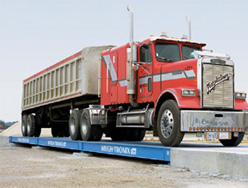Maintaining Your Truck Scale to Prevent Downtime
Truck scales are the muscle of the weighing system. As one of the most versatile weighing solutions, truck scales can be used to weigh a variety of materials. These include concrete, rock and other aggregates.

However, while the truck scale itself is important, its preventative maintenance program is crucial. Correctly serviced weighing equipment reduces the likelihood of inaccurate readings, which can result in under or overcharging. Further, regular preventative maintenance reduces the likelihood of damage to the scale. Such damage can lead to excessive downtime, costly equipment repairs and lost profits.
Having the right service and maintenance contract in place is essential. However, there are also other preventative steps that an operator can do to ensure that equipment stays reliable. It is good practice to conduct routine maintenance checks on the truck scale. This should be done with daily, weekly, monthly and twice yearly tasks.
These simple tasks are important. This is because an accumulation of dirt, debris, water or slurry will affect the integrity of the truck scale. In the short term, this will lead to inaccurate weighing. If allowed to continue, the load cells or weighbars will fail, making the truck scale unusable.
Daily Tasks: Truck Scale Inspection
On a daily basis, operators should visually inspect the platform to ensure that it is free from debris. They should also check that the side and end frames are not fouled and ensure that the digital display reads zero before a vehicle drives on to the platform. Vehicles should approach the platform slowly, avoid sudden braking and, for an accurate weight reading, ensure that all the wheels are on the truck scale.
For pit-mounted installations, if T-section rubber is fitted, operators should confirm that it is located correctly and that any pit drainage system and/or automatic pumps are also working correctly. For surface-mounted truck scales, there should be adequate clearance between the superstructure and the ground.
Weekly Tasks: Weight and load cell checks
Weekly tasks involve carefully checking the load cell assemblies for debris build-up, which should be removed carefully without damaging the load cell cables. Operators should also carry out a weekly weigh check using a loaded vehicle, comparing the vehicle’s weight when weighed at each end of the truck scale with its weight at the center of the platform. Any discrepancies of ±2 indicated divisions need to be reported to avoid future inaccuracies.
Monthly Tasks: Truck Scale Foundations and Cleaning
Pit-mounted truck scales should be checked every month for possible ‘ponding’ of water, debris build-up or other damage to the leading edge of foundations and/or the side and end frames of the platform. If the platform has moved excessively since the last inspection it should be reported to the maintenance service provider.
Operators should also repeat the end-middle-end test, as detailed in the weekly tasks, and record the readings. The truck scale should then be jet washed to remove any loose debris and/or any build-up of material beneath the platform, taking care to avoid the load cells or weighbars. Then, the truck scale should be rebalanced, reset to zero and the end-middle-end test carried out again. The results of these ‘before’ and ‘after’ tests should be compared and any discrepancies reported.
Twice Yearly Tasks: Truck Scale Health Check
Every six months operators should check for any signs of structural damage to the truck scale. For example, foundations should be inspected for any significant movement or cracks. Any sign of damage reported to the maintenance service provider. For surface-mounted truck scales, the load cell cables should be checked and once again any damage should be reported.
Additional Truck Scale Checks
Although modern truck scale designs generally incorporate protection against lightning, both within the load cell and through the fitting of lightning conductors, it is important to check the truck scale for damage after any thunderstorm.
Electrical welding should never be carried out on the truck scale structure without first consulting the service provider, as this can seriously damage the load cells or weighbars.
Preventative Truck Scale Maintenance
With proper care a truck scale will provide trouble-free operation between planned maintenance visits. However, operators should not attempt any detailed repair or maintenance work on their own as this may affect the truck scale’s operation.
In addition to a preventative maintenance plan, a planned maintenance contract should also be employed to cover any breakdowns, repairs and/or part replacement.
For more information on truck scale maintenance, visit our service pages.

 United Kingdom
United Kingdom  Canada
Canada  Canada (fr)
Canada (fr)  India
India  Malaysia
Malaysia  Ireland
Ireland